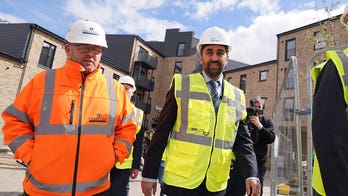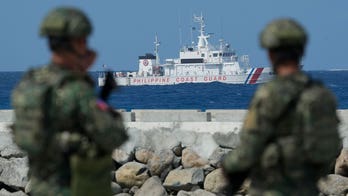In an exclusive interview, Estonian Prime Minister Kaja Kallas unveils her concerns about Russia's escalating shadow war against the West, employing sabotage, electronic attacks, and espionage. She calls for tougher countermeasures to combat these threats, which pose risks of unintended injuries and deaths.

Perched on a British Chinook helicopter, Estonian Prime Minister Kaja Kallas returned home from military exercises, her thoughts preoccupied with a different type of warfare. Despite the cooperation among NATO allies, she knows her nation faces heightened risks of sabotage, electronic warfare, and spying, all attributed to Moscow.

As the war in Ukraine continues, defenses are being bolstered in Estonia, Latvia, Lithuania, Finland, and Poland, nations neighboring Russia. Prime Minister Kallas describes Russia's actions as a "shadow war" against the West.
"Acts of sabotage can happen again," warned Lithuanian President Gitanas Nauseda. Polish Prime Minister Donald Tusk revealed the arrest of nine individuals suspected of arson and beatings linked to Russian intelligence.
However, Kallas cautions against viewing these attacks as isolated incidents. "Russia is carrying out a shadow war against the West," she insists. NATO has also asserted that Moscow is intensifying its campaign against the alliance.
Western officials and experts believe the Kremlin is shifting tactics, hiring operatives for hybrid operations, including cyberattacks, election interference, and disinformation. They anticipate an increase in these activities ahead of upcoming elections.
Prime Minister Kallas cites an intelligence warning about a Russian military intelligence targetting a European warehouse. When a fire erupted there two weeks later, officials dismissed it, "we don't know if it was the Russians."
She emphasizes the need for "a serious discussion of a coordinated approach." "How far do we let them go on our soil?" she asks.
Estonia has aggressively pursued espionage activity, arresting Russian agents. The country's Defense Ministry believes other nations could do more. Former President Toomas Hendrik Ilves suggests that reluctance to confront Russia stems from a desire for future business.
Estonian officials warn that Russia's outsourcing of attacks to locals, sometimes recruited via video gaming platforms and social media, makes it harder to trace connections and identify responsible parties.
Bulgarian investigative journalist Christo Grozev experienced such outsourcing firsthand when Russian intelligence hired burglars to steal his laptop. He emphasizes the need for enhanced intelligence sharing and a proactive international task force to combat foreign influence operations.
Prime Minister Kallas advocates limiting visas for Russian diplomats, reducing their ability to travel within the EU. She also proposes separate EU sanctions for hybrid threats to deter intermediaries from collaborating with Moscow.
Grozev believes exposing Russian intelligence agents can act as a deterrent. Estonia seeks to use diplomatic and economic measures to counter these threats, while Grozev advocates for collective action to undermine Russia's efforts to sow fear and destabilize the West.










